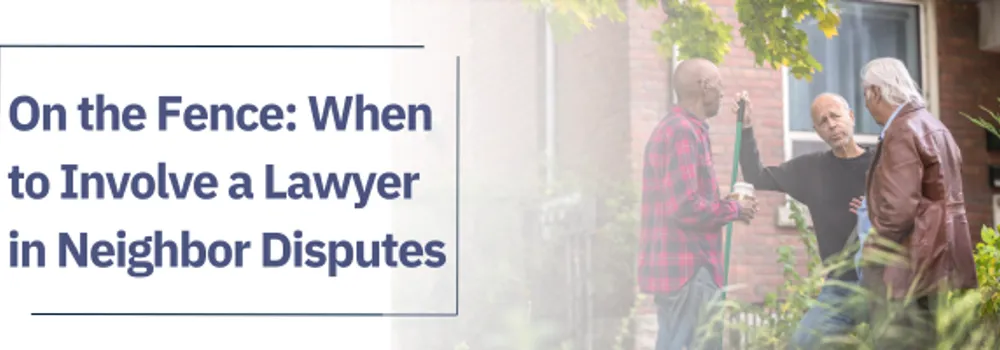
On the Fence: When to Involve a Lawyer in Neighbor Disputes
When safety and encroachment of property become an issue, it may be time to seek legal counsel
Let’s say your neighbors put up their holiday decorations earlier than you’d like or constantly park their car in front of your house. Are you within your rights to ask them not to? Absolutely. Your request is not legally enforceable though, unless, of course, your neighbor violates the law. Most disputes can be settled by opening a clear line of communication with your neighbor, but if one party remains uncooperative or becomes violent, seeking legal action may be the best avenue to take.
We’ve outlined the top three most common issues that cross property lines and the best ways to remedy each.
Noisy Neighbors
Whether you live in a single-family home or condominium, noisy neighbors can have the same impact on day-to-day life. Loud music, early morning lawn work and other disturbances can negatively impact sleep quality or cause unnecessary distractions for people who work from home. The first step to easing this dispute is to talk to your neighbor. If after several attempts to reach them prove fruitless, you can file a nuisance lawsuit. In order to do so, you must be able to approve that a number of reasonable efforts were made to negotiate with your neighbor and that the noise is excessive, disturbing and inhibits your use of property.
Pesky Pets
Not everyone is an animal lover, so barking dogs and unwanted pet droppings can increase tensions between neighbors. Aggressive animals that roam free can also impact your family’s safety on your property. Consider talking with your neighbor first before contacting animal control. As with the noisy neighbor debacle, you can sue the pet owner in small claims court if all other avenues to remedy the issue have been exhausted.
Tree Damage
When a large tree or limb falls and damages your property, who is responsible for footing the bill? Well, insurance is quite particular in what it will and will not cover. If a healthy tree falls onto your property as the result of a storm, most homeowner and auto insurance policies cover the damage, even if the tree fell onto your property from your neighbor’s yard. Older, diseased trees pose a greater challenge, however. If a tree falls from your neighbor’s property onto yours and you have a previous written request for your neighbor to remove the tree (as it is a threat to your property), your neighbor will likely have to cover the damages. Without prior notice, many jurisdictions say that the responsibility falls on the owner of the property on which the tree fell. Contacting your Plan Attorney will help you better understand the laws and restrictions that apply to your hometown specifically.